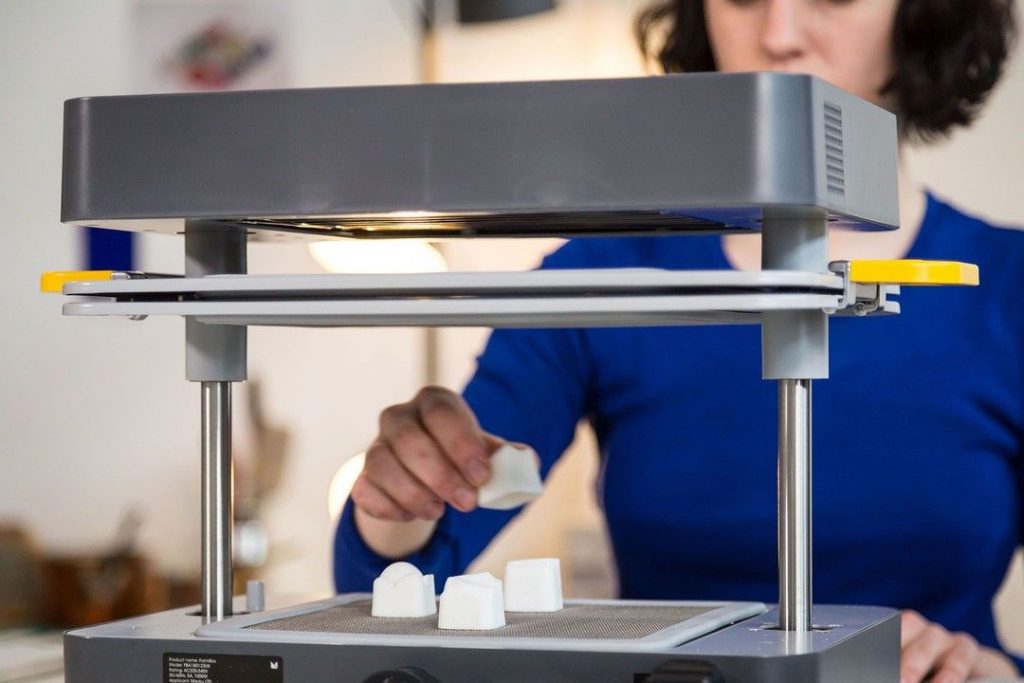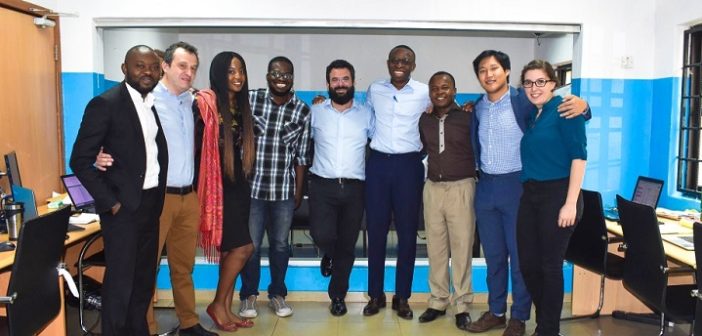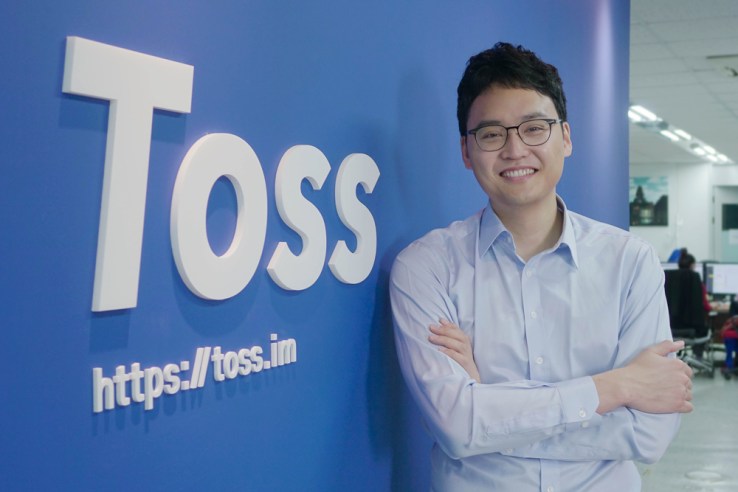
China is rising in many ways — the economy, consumer spending and technology — but still many of its population looks overseas, and particularly to the West, for cues on lifestyle and health. That’s a theme that’s being seized by LemonBox, a China-U.S. startup that lets Chinese consumers buy U.S. health products at affordable prices.
Indeed, the recent scare around Chinese vaccinations, which saw faulty inoculations given to babies and toddlers in a number of provinces, has only fueled demand for overseas health products which LemonBox founder Derek Weng discovered himself when his father was diagnosed as having high blood sugar levels. Weng, then working in the U.S. for Walmart, was able to look up and buy the right medicine pills for his father and bring them back to China himself. He realized, however, that others are not so fortunate.

UK based startup Mayku, with its desktop vacuum forming machine, is empowering makers to do more with their 3D printers. Compact and easy to use, the FormBox system can be used to make a variety of molds, for concrete and plaster casting, soap making and chocolate craft, or packaging for figurines and other handmade items. In many ways, it is the final professional touch makers need when attempting to create a business from their DIY products.
At 3D Printing Industry, the engineering team have reviewed the Mayku FormBox in terms of its ease-of-use, material versatility, and application over a variety of different objects ranging in size and complexity.
The FormBox safety setup
The FormBox thermoformer is delivered as a fully assembled system. The starter package for the machine includes: a universal vacuum adapter, detailed manual, three sample-formed objects, 15 Form Sheets of white HIPs, 15 Cast Sheets of transparent, food-safe PETG, and 1kg of castable plaster to try some first casts.
For setup, the user only need attach their own vacuum cleaner, a task facilitated by Makyu’s universal adapter. To start the first mold, a sheet of selected plastic is clipped into the sliding tray at the base of the machine. Then the heat and melting time is set by the corresponding dials on the front, and the user lifts the tray up to the ceramic heater at the top.
Timer settings are given in 20 second increments, and heater settings from 1 – 6. For each sheet of material the manual outlines the respective settings required to reach near-melting point. By simplifying this stage of the process, Makyu serves to help reduce user error.
When heating, the user is required to place the object-to-be-formed at the center of the lower vacuum plate (200mm x x200mm). Once at temperature, the tray containing the plastic is moved down in a single, steady movement. After counting down the timer, the FormBox then automatically shuts off the vacuum, and the plastic is left to cool and harden.
In one final step, all the user has to do is remove the formed object from the mold, with a little wiggling and sometimes help from a flat-head screwdriver for leverage. The mold is then ready to use.
READ MORE>>>

By Selina Wang Updated on
- The deal is said to push Coupang’s valuation to $9 billion.
- Coupang expects nearly $5 billion in revenue by year-end
SoftBank Group Corp.’s Vision Fund will invest $2 billion in South Korea’s Coupang, giving the e-commerce giant funds to accelerate development of new shopping and delivery services.
Coupang, founded in 2010, is Korea’s largest online retailer, selling more than 120 million items from consumer electronics to food. The Seoul-based company says that half of Korea’s population has downloaded its mobile app.
The deal marks another enormous bet on e-commerce for SoftBank founder Masayoshi Son, who made a fortune backing Alibaba Group Holding Ltd. before it turned into China’s dominant provider. SoftBank put an initial $1 billion investment into Coupang in 2015, valuing it at $5 billion, according to people familiar with the matter. The valuation in the current deal is $9 billion post-money, or after the additional capital is included, the people said.
“Masa is a visionary leader. He’s always challenged us to think big,” said Bom Kim, founder and chief executive officer. “This round came from understanding that what we’ve built is now the foundation for immense impact on customers.”
Read More>>>

Fastwork, an online freelancing platform with operations in Thailand and Indonesia, announced today it has secured US$4.8 million in Series A financing round led by regional venture capital firm Gobi Partners.
Vickers Venture Partners, LINE Ventures, Tekton Ventures and Partech Partners also joined the round, which brings Fastwork’s total amount raised to date to US$5.5 million.
“SMEs are growing at an unprecedented pace in the region’s emerging markets, and as a result there’s a lack of skilled talent to support their growth. Thus, freelancing platforms, like Fastwork, are heavily sought after for their ability to bridge between SMEs and freelancers/outsourcing agencies,” Gobi’s Venture Partner, Arya Masagung, said.
Fastwork was started in 2015 by a group of engineers and entrepreneurs from Silicon Valley and New York with a mission to help businesses and employers in Southeast Asia to find and hire freelancers. The startup said in a press note that more than 300,000 businesses across the region use its platform for nearly 22,000 services ranging from graphic design, online & influencer marketing, data entry, to web & app development.
As for freelancers, the platform enables to collect payments, promote their services, manage their orders, exchange files and communicate with their clients anywhere, anytime.
Read More>>>

Uber may be global but it is very much the alternative in some parts of the world. One such place is Bangladesh — the South Asian country that’s home to 160 million people — where local rival Pathao is backed by Go-Jek and recently raised $10 million. Now Pathao’s closest rival, Shohoz, has also pulled in investment after it closed a $15 million funding round.
Shohoz — which means ‘easy’ in Bengali — started in 2014 offering online bus ticket sales before expanding into other tickets like ferries. The startup moved into on-demand services in January when it added motorbikes and then it recently introduced private cars. CEO Maliha Quadir told TechCrunch that it is now registering one million completed rides per month as it bids to “simplify” life in capital city Dhaka, which houses over 18 million people and offers limited transport options.
“Bus tickets will remain an important part of our business, [there’s] lots of synergy with ride-sharing,” she explained in an interview. “Dhaka has a super dense population with bad infrastructure, if anything there’s a better case for ride-sharing than Indonesia… there’s no subway and transport is a horrid nightmare.”
Singapore-based Golden Gate Ventures — which recently closed a $100 million fund — led the new Shohoz round. Linear VC of China, Tekton Ventures, Partech Partners, 500 Startups and Singaporean-based angel investor Koh Boon Hwee also took part.
Read More>>>

Atrium is announcing on Monday that it has raised $65 million in a round led by Andreessen Horowitz, with Y Combinator’s Continuity Fund, Sound Ventures and General Catalyst joining the round.
The funding comes as Atrium has helped some of tech’s fastest-growing companies raise a combined $500 million, including scooter company Bird, Alto, MessageBird and Sift Science—250 clients overall. Atrium served as the law firm for each, providing a lawyer on the customer end and using technology to automate some of the related filings under the hood. The startup will use the funding to hire more employees on both its legal services and technical sides.
“This was a problem I’d seen in my own experiences, where all these parts around legal were like a blocker to what I wanted to do, and the legal bills felt like Russian roulette,” says Kan. “It’s almost like a tax you have as a business owner. That’s why I wanted to attack this problem.”
Founded in mid-2017 after Kan left Y Combinator to do a startup incubator, Atrium’s full stack law firm approach means that it’s got an unusual mix of legal-trained employees, business operations professionals and engineers. Kan’s cofounders Augie Rakow and Nick Cortes come from backgrounds at law firm Orrick, where Rakow represented Cruise in its $1 billion acquisition by GM, and McKinsey.
Read More>>>

LinkShops (CEO: Kyeong-mi SEO), an online shopping mall for DDM (Dongdaemun Market: located in Jongno-Gu, Seoul, Korea), has updated its service to make the shopping experience more convenient and efficient.
Customers can place their orders through the website or mobile app and receive their purchased products within a day, all without having to visit the Dongdaemun Market themselves.
The recent updates of LinkShops include: downloading and organizing the online purchase order lists through excel, managing the amount of stock and coordinating with the pre-order service, advanced-browsing for the past orders, and grouping the individual purchases in one receipt.
Furthermore, this upgraded online shopping platform focused on resolving the frequently encountered issue of ‘out of stock.’ By coordinating with its product -managing team, LinkShops can now regularly monitor the amount of wholesale stock and determine when the products will be restocked when there is a shortage. The relevant retail dealers are immediately informed so that the customers can place their pre-orders or get their refunds right away.
In addition, some customers may have experienced the inconvenience in issuing multiple receipts when purchasing goods from different stores. With LinkShops, the customers can view the complete list of their orders on a single receipt.
“DDM is known for its hands-on businesses where the wholesale merchants and retail dealers actively and directly engage in the transaction processes. In that sense, our company aims to provide a more convenient and efficient service for both parties,” the company’s vice-chairman, Young-Ji OH, commented.
Read More>>>
Wipro Ltd. Chairman Azim Premji is backing another U.S. startup, leading a $100 million round in e-commerce fraud-prevention company Signifyd.
The Indian tech titan’s personal investing vehicle Premji Invest led the deal, valuing the seven-year-old company at roughly $400 million, according to a person with knowledge of the deal, who asked to remain anonymous because the details are private.
The cash infusion is the latest in a line of similar late-stage bets by the fund, including business software companies Apttus Corp. and Anaplan Inc. It also marks a major inflection point for Signifyd Inc. which aims to help e-commerce sites stem fraud and reduce the number of legitimate transactions that are improperly declined.
The San Jose, California-based company plans to double its staff to 320 and open an office in Barcelona during the next year, Co-Founder and Chief Executive Officer Raj Ramanand said.
Like competitors Forter Inc., Riskified Ltd. and others, Signifyd makes software that analyzes online transactions for fraud. It pulls in additional data, including the length of time an email address has been in use, the number of social media contacts connected to a potential customer and the type of device being used. It then uses that information to identify potential shysters and green-light ones that don’t fit a standard profile, but that Signifyd still deems as legitimate.
For example, one bicycle seller was declining roughly 30% of its transactions because the billing and shipping addresses didn’t match, Ramanand said. Upon further analysis of timing (almost all the purchases in question were made in August and September), home values and the like, Signifyd determined these were mostly parents purchasing bikes for their kids starting college. The company’s software approved the transactions and the bike shop recouped revenue, he said.
Read More>>>

Nigerian fintech startup Lidya has raised US$6.9 million in a Series A investment round led by Omidyar Network to allow it to expand its loan book, scale across Nigeria and Africa, and grow its team.
Launched in 2016, Lidya is a digital financial services platform focused on improving access to credit for micro, small, and medium-sized enterprises (MSMEs) in Africa.
Since its launch, it has made over 1,500 business loans to help MSMEs in farming, hospitality, logistics, retail, real estate, technology, and health get the capital they need to grow their operations.
Having raised US$1.25 million in funding in March of last year, Lidya has now secured a US$6.9 million round led by Omidyar Network, the Silicon Valley impact investment firm established by eBay founder Pierre Omidyar. New investors Alitheia Capital (via the Umunthu Fund), Bamboo Capital Partners, and Tekton Ventures, also joined the round, which included existing investors Accion Venture Lab and Newid Capital.
Read More>>>

By David Pilling MAY 23, 2018
South African media group Naspers is investing $89m in Frontier Car Group, an online marketplace for second-hand cars, in a deal valuing the emerging markets focused start-up at about $270m.
The cash injection from Naspers’ classifieds division brings to $170m the amount raised this year by Berlin-based FCG, which this month raised $58m in a Series B funding round after a $22m fundraising in February.
The move comes two months after Naspers earned more than $10bn by trimming its 31 per cent stake in Chinese social media and gaming company Tencent — one of the most successful venture capital investments in history. This month it sold an 11 per cent stake in Flipkart, an Indian e-commerce platform, raising a further $1.6bn.
“Having this war chest will help to accelerate our M&A agenda but only if this makes strategic sense,” said Martin Scheepbouwer, chief executive of OLX Group, Naspers’ classifieds subsidiary.
“Naspers’ DNA is to move confidently and with commitment,” Mr Scheepbouwer said, adding that it was important to move fast. “We have for decades invested in frontier markets where no one else dares to go.”
FCG’s online marketplace fitted OLX’s strategy of making online sales more convenient in often difficult markets in Africa, Latin America and Asia, he said. OLX operates in 40 countries and has 330m users per month.
Read More>>>

We’ve seen a large wave of used-car sales startups launch across developed markets like the U.S. and Europe, disrupting a marketplace that has largely been untouched for years. Now a startup focusing on the used car-sales opportunity specifically in developing economies is ramping up its activities.
Frontier Car Group, a Berlin startup that has built a used-car marketplace targeted specifically at countries outside of Western Europe and North America, is announcing $58 million in funding — $41 million in equity and $17 million in debt funding — to continue expanding its business into Africa, Latin America and Asia, where it has sold 50,000 vehicles since launching at the end of 2016 and is on track to do $200 million in annualised revenues per year.
The Series B brings was led by Balderton Capital and TPG Growth (both of which participated in Frontier’s previous $22 million round), with Fraser McCombs Capitaland Autotech Ventures — two automotive-specific funds — also participating.
Frontier is not disclosing its valuation with this round but a source close to the company said the demand to participate in this round was high and led to two unsolicited Series C term sheets — each for around $100 million — and both on a pre-money valuations of over $200 million.
Read More>>>
SAN FRANCISCO, March 23, 2018 — Candex, the simplest way businesses engage, track and pay for high volume services, has raised $3.5 million of series seed funding from Edenred Capital Partners, Partech Ventures, Advisors.Fund, Camp One Ventures, NFX, Tekton Ventures, Big Sur Ventures and fintech angel Mark Goines. The financing positions Candex to accelerate its business in Fortune 500 customers and beyond.
Companies are taking advantage of the gig economy and using more vendors than ever to compete and stay nimble. In the typical large enterprise organization, admin layers across departments inefficiently cope with the 90 percent of tail service vendors that account for only five percent of spend. Sometimes the administrative costs exceed what is actually paid.
Read More>>>
Everledger, a London, UK-based developer of real-world applications based on emerging technologies, closed US$10.4m in Series A funding round.
Toronto-based investment banking firm GMP Securities co-ordinated the round with lead investor, the Canadian arm of Fidelity Investments. Participants in the round included Vickers Ventures Partners, Graphene Venture Capital, and existing investors Tekton Ventures, FPV, Fenbushi, Bloomberg Beta, and Rakuten. In conjunction with the funding, Dr. Finian Tan, currently the chairman of Vickers Venture Partners, joined Everledger’s Board.
The company will use the funds to continue to develop its platform and expand its business reach.
Led by Founder & CEO Leanne Kemp, Everledger is a technology enterprise that tracks the provenance of high-value assets on a global digital ledger. Using blockchain, the company provides stakeholders across supply chains with an immutable history of an asset’s authenticity, existence and ownership. Everledger started off with tracking diamonds and currently has the provenance of over 2 million diamonds cryptographically-certified on the blockchain. This tech solution has since expanded into the world of coloured gemstones, jewellery, fine wine and art, among other industries.
Read More>>>
You might get to actually save money while you’re traveling if you just leave some free space in your bag — or not pay for that travel at all — if Daria Rebenok’s plan plays out.
As avid travelers, and ones longing for products from home they can’t get abroad, she and Artem Fedyaev decided to start Grabr to work on exactly this problem. While you might not be able to get those products you’d find everywhere on shelves in a foreign country on Amazon, or anywhere else online for whatever reason, there are people traveling to and from those countries all the time. Grabr serves to connect those travelers that have a few square inches or feet in their bags, tasking them with bringing back those products abroad for a fee. Grabr today said it has raised a new $8 million financing round led by Foundation Capital, as well as some additional investors we’ll add at the bottom.
Read More>>>
By ROBERT HACKETT
In 2011, Patrick Webster, a security researcher, notified an Australian pension fund manager of a glaring flaw in its website that allowed him to access people’s personal information. The firm, First State Superannuation, returned the favor by sending the police to his home and threatening to sue him.
The incident was a disaster—a masterclass in how not to treat vulnerability researchers. First State Super eventually backed down and thanked Webster, but not before catching considerable flak for its handling of the affair.
Now First State Super has signed on as an investor in Bugcrowd, a San Francisco-based startup that runs bug bounty programs for businesses. The new round of fundraising, led by venture capital firm Triangle Peak Partners, is worth $26 million.
Read More>>>

Michigan -based startup May Mobility, which is trying to swap out current transportation options for corporate and other clients with self-driving small shuttles, has raised $11.5 million in sed funding from investors including BMW i Ventures and Toyota AI Ventures, along with existing investors. The round comes just about a year into the company’s launch, and 2018 will also see May Mobility launch its first commercial operations in the later law of the year.
May Mobility has a team that includes DARPA Urban Challenge participants, as well as vets of Ford, GM, and Toyota as well as the University of Michigan’s automotive engineering programs. The company’s goal has been to provide self-driving solutions that are practical on real routes today, using technology currently available, with defined shuttle paths. It’s also aiming to offer commercial benefit to clients by managing the fleet service from end-to-end, including vehicle maintenance and operation the shuttles on a daily basis.
Read More>>>

Hwang Jung-ho, 26, looks into a smartphone app to keep track of retailers’ orders he and his team picked up at KwangHee Fashion Mall – one of Dongdaemun’s fashion wholesale market, central Seoul, in mid-December. [PARK SANG-MOON]
People in Dongdaemun, central Seoul start their day after the sun sets. The neighborhood is unlike anywhere else in Seoul. Shoppers, motorcycles and small trucks rapidly move around the narrow brightly-lit alleys, all carrying huge vinyl bags stuffed with clothes.
At 11:30 p.m. on a cold December night, Hwang Jung-ho, 26, started work. He swiftly moved through the corridors of KwangHee Shopping Mall, one of Dongdaemun’s largest wholesale fashion markets. It was close to midnight, but the fashion market was busy.
Hwang got off the escalator on the third floor and ran to a clothing store.
“Hi, I’m here for Linkshops,” he called out. “[We have orders for] five ‘vogue knit dresses’ and two ‘stripe blouses.’ Make it quick please.”
The employee pulled out a small bag with “Linkshops” written on the tag and handed it over.
Hwang visited a number of other shops, collecting small plastic bags as he went. When he had about 20 small bags he threw them all into a large bag, called a daebong, a Korean portmanteau meaning big bag. Hwang’s daebong is so big that even he could fit inside.
As many as 20 daebongs are filled on just one floor of KwangHee Shopping Mall every night. Each one weighs well over 15 kilograms, but Hwang says he often carries as many as four at the same time.
“I can use both hands, my wrists, shoulders and even thumbs,” he said. “The trick to lifting them easily is pushing with your knee before swinging them up to your shoulder.”
Hwang runs around the narrow corridors with his huge bags, rushing up and down the stairs in between floors instead of using the crowded escalators. He says this is the only way he has time to pick up all the orders received for the night.
When Hwang’s bags are full he loads the clothes onto trucks ready to be distributed around the country in the morning.
By 1 a.m. the corridors are absolutely packed with shoppers, stuffed vinyl bags of all sizes and men like Hwang, running the gauntlet of Dongdaemun’s wholesale shopping center.
Hwang is known as a sa-ib samchon, which literally means a personal purchase uncle in Korean. Hwang and his colleagues are the backbone of Dongdaemun’s wholesale business. They pick up clothes that have been ordered by retail stores around the country, pay on their behalf and then load the goods onto trucks to be delivered in the morning.
But Hwang has one trick that sets him apart from the rest of the sa-ib samchon. While his colleagues scurry around the market desperately trying to keep track of hand-written notes detailing their orders, Hwang keeps track of his business through an app.
Developed by local start-up Linkshops, the app shows Hwang and his team’s assignments for that night, detailing how many units of each item he needs to pick up, what store they come from and what building they’re in. Linkshops also takes care of the money, so Hwang no longer has to act as a financial middle-man for retailers, shaving valuable seconds off each collection.
“The app shows which orders we have to pick up that day and where they are – the store and the building,” he said. “Others cross off product names written on paper with a pen, but we check them off on our app so our entire team shares which orders are left.”
Read More>>>

E-commerce fraud is a growing problem, but Signifyd thinks it has a solution to save businesses money.
Their company is growing fast and has closed a $56 million Series C investment led by Bain Capital Ventures. Menlo Ventures and American Express also participated in the round.
Signifyd counts big clients like Jet.com, Peet’s Coffee and Lacoste, where it uses its pattern recognition technology to warn them upfront about potential fraudulent charges. Signifyd is so confident in its assessments that it offers the companies a guarantee, so they don’t have to pay for errors.
The product “protects the merchants so they don’t have to bear the liability,” said co-founder and CEO Rajesh Ramanand. The team has been developing a “machine learning platform that makes these decision in real-time.”
Read more–>

Don’t you love it when there’s a fragmented market with many different actors and outdated tech products? French startup FretLink is using all the tips in the startup handbook and applying them to a neglected industry — the trucking industry.
FretLink is a software-as-a-service marketplace connecting thousands of transportation companies with companies that need to send big piles of stuff. And the startup just raised $6.4 million (€6 million) from Daphni, Tekton Ventures, Elaia Partners and Breega Capital.
If you’re like me, you don’t know much about the transportation industry. Sure, you know the names of a few big logistics companies that bring you your Amazon packages. But it’s a bit more mysterious if you think about the pallets that move from one warehouse to another.
Read more->

Viva Republic, the company behind Korean financial services app Toss, has closed a $48 million Series C funding round which includes a strategic investment from payment giant PayPal.
The deal is PayPal’s second investment this year — coming just days after it backed health startup Virta — but the round was led by San Mateo-based VC firm Goodwater Capital, which led Viva Republica’s Series B round and counts Korean tech giants Kakao (messaging) and Coupang (e-commerce) among its portfolio. Bessemer Venture Partners, Altos Ventures, Tekton Ventures and Partech Ventures also participated in the round.
Read more–>


